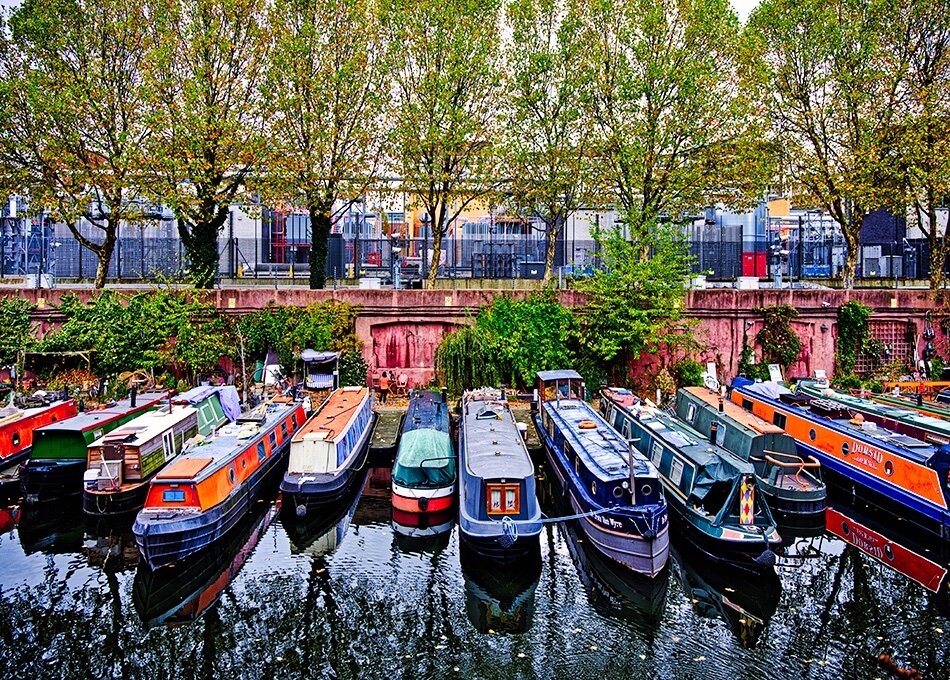Time Off In Summer
By the Seine on a warm summer evening. In Paris, city of shimmering light, sitting here, it feels as if you fleet the time away “like they did in the golden world.”
London’s Little Venice district. Hippie-era houseboats on waterways inside this little island, which ruled the oceans and colonized much of the world. But their forebears having done that, some are content now to rest on still water, as quietly as a painter’s composition.
A waterfall in New York’s Finger Lakes attracts a small group of unrelated people. These include several random dogs and their owner (with the greying beard); and a little girl who scrunches her bottom off the wall in a maneuver that tots her age perform the world over. Meanwhile her mother and father (who scratches himself in a similarly timeless gesture) linger pleasantly with her; and two separate people, young man and young woman sit, conspicuously solitary, each in long reflection. Their attitudes suggest they are thinking of loneliness and love. Is the young man photographing the falls with his phone—to then send the image off to his lover? Indeed, the lover—a lithe, handsome young man—arrives later and they kiss. But the young woman—her composure and dropped shoulders suggests that her thoughts are deeper than time will so readily resolve.
The falls—water streaming like partially braided hair down in front of ponderously etched rock—seems to thunder through this disparate collection of people (and dogs) gathered along the cracked wall and tie them together with the sound of some unimaginably heavy, inexpressive, forever unvarying Being that goes on and on.
This is the first shot of a series of photographs taken on New York’s lower West Side.
On a warm afternoon, a constant flow of multi-directional people (slow and leisurely, unlike the norm for other places in New York) stroll by. Almost like the chorus in ancient Greek drama, a group of loungers on the stoop of a store observe and comment on the passersby. But no action has yet begun; this must be the opening scene.
In this shot, the action does begin. In a cleared space, center stage rear left, an irreversible event (one that somehow promises to change everything?) is poised itself to happen. The drama must be about a parting, one that has unforseen consequences.
The consequences have occurred, and they have been terrible and irreversible. But true to the spirit of Greek plays, the scene of suffering has occured offstage. Conventionally, it would be reported to the chorus of loungers and the audience by a messenger. Writing this caption, I am the messenger. Consider this message to be about the divinely-sanctioned fury of loss that engulfs, with pity and terror, the two now unhappy and doubtless protagonists, whose apparently routine parting for just a few days instead was the occasion for a dark crack to open up in each of them, shattering all their assumptions about reality.
In this last picture, that awful reversal is over, and forgetfulness has swallowed all remembrance of the two. And the crowd again takes over the stage with the thoughtless, but perhaps blessed normality of another lazy warm day, and the flow begins again, for whatever was done is done and has been completely forgotten.
But for one detail: is it a bitter irony? Or is it a message of hope? Where the fatal couple once parted, now a younger, more ordinary pair who clearly are (for now) partners push their pram heavy with future and hope off the curb, and into the now only subtly parlous commerce of the street.
At the Spanish Steps in Rome, a crowd of young, international tourists congregate and mill about. This is a tradition that has gone on for centuries. Goethe was here; Keats lived here. It still goes on. Whether it will survive the present pandemic, no one (at least at the time of my making this blog) could say.
One last image. It is a photograph of a perhaps more timeless and resilient kind of gathering—one that has gone on since the domestication of animals long ago in the dark backward of human history. It was already well established before the time of the ancient Greek dramatists referenced above. Poets celebrated it—they depicted shepherds’ simple lives, loves, closeness to nature, and gentle nurturing of their sheep as an ideal way of life. It is an embodiment of total leisure, tranquility, and harmony. It is what practitioners of an ancient technique of meditation saw as a supreme good: “ease of well being.” At the same time, it is what Walt Whitman, surely one of the foundational poets in American tradition, celebrated as the beginning of inspiration: “I loafe and invite my soul / I lean and loafe at my ease observing a spear of summer grass.”
So much for hard work and rags to riches.
Between their birth and their butchering, sheep hang out in the timeless afternoon sunlight.







